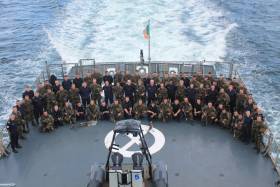Displaying items by tag: Recruitment Troop Concerns
Recruits Required for Defence Forces But Amid Concerns Over Troop Numbers
#navy - A new recruitment competition has been opened by the Defence Forces writes The Irish Times, but this is amid concerns over dwindling troop numbers in the military.
Announcing the recruitment drive on Wednesday, Minister of State for Defence Paul Kehoe said the move “reflects the Government’s commitment to meeting the Permanent Defence Forces strength targets”.
A recent report commissioned by the Defence Forces found it is now at a “critical point” with staff numbers well below the target of 9,500.
The report, compiled by researchers at the University of Limerick, noted that figures for unit sizes were often embellished as the absence of members on leave, long-term training courses or overseas missions was not taken into account.
Mr Kehoe said previous recruitment campaigns will deliver more than 800 new Defence Forces personnel by the end of this year, although it is not known exactly how many new staff are proposed to be taken on as part of the latest wave.
“This general service recruitment campaign will build upon the successes of previous recruitment campaigns from which it is expected that just over 800 new personnel will have been inducted into the Permanent Defence Force by the end of 2017,” he said, adding: “As this will deplete existing panels, it is now appropriate that we initiate a new campaign in order to provide for the induction of further personnel in 2018.”
The newspaper has much on this story, to read click here and information on datelines for applicants wishing to join the Defence Forces including the Naval Service.






























































